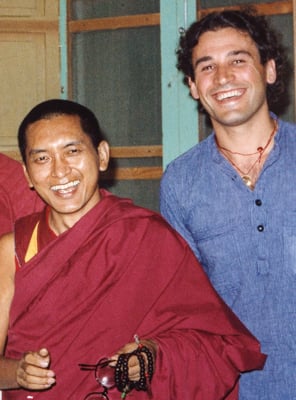Dear Friends,
Thank you so much for your interest in LYWA and for reading our eletter. We've been sending these out monthly since the beginning of 2003 and you can see them all here. Please rejoice with us at all we've been able to do together—we couldn't have done it without you, our supporters—and thank you for continuing to work with us.
As I mentioned last month, there is great, ongoing interest in Big Love: The Life and Teachings of Lama Yeshe. Recently, Professor José Cabezón wrote:
This is an important work for many reasons, not least because of its contribution to the history of the spread of Tibetan Buddhism in the West. An amazing chronicle of the life of one of the most influential lamas of the 20th century.
To see what others are saying, please go here.
LAMA YESHE'S ENLIGHTENED EXPERIENCE
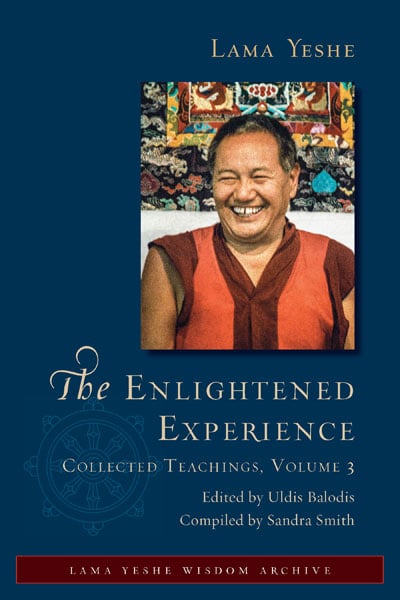 We have now published the third volume of The Enlightened Experience, an ebook series of collected teachings by Lama Yeshe. Volume 3 features three discourses given by Lama Yeshe at the Sixteenth Kopan Meditation Course in 1983. In these teachings Lama offers practical advice on how to integrate Dharma in daily life. He discusses the principles of loving kindness and compassion, which are fundamental to all religions, and urges students to change the attitude of self-cherishing into a determination to hold others dear. As Lama said, “Be wise. Treat yourself, your mind, sympathetically, with loving kindness. If you are gentle with yourself, you will become gentle with others.” You can read an excerpt from Volume 3 in this month's teaching below.
We have now published the third volume of The Enlightened Experience, an ebook series of collected teachings by Lama Yeshe. Volume 3 features three discourses given by Lama Yeshe at the Sixteenth Kopan Meditation Course in 1983. In these teachings Lama offers practical advice on how to integrate Dharma in daily life. He discusses the principles of loving kindness and compassion, which are fundamental to all religions, and urges students to change the attitude of self-cherishing into a determination to hold others dear. As Lama said, “Be wise. Treat yourself, your mind, sympathetically, with loving kindness. If you are gentle with yourself, you will become gentle with others.” You can read an excerpt from Volume 3 in this month's teaching below.
Visit our online store to order The Enlightened Experience: Collected Teachings, Volume 3 from your favorite vendor. LYWA Members can download the ebook for free from the Members Area.
on the LYWA Podcast: The Path of Universal Responsibility
Just by lecturing that we need compassion, that alone cannot generate compassion in the hearts of the people in this world. We need to learn how to develop compassion. Compassion, like rain falling, doesn’t just happen.
– Lama Zopa Rinpoche
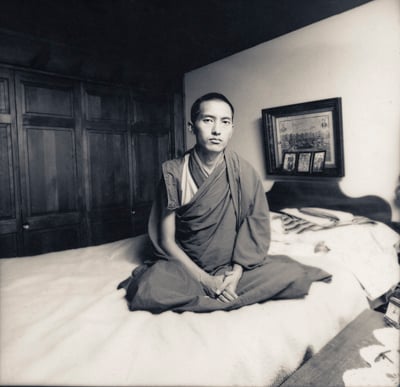 This month on the LYWA podcast we bring you teachings given by Lama Zopa Rinpoche at the 36th Kopan Meditation Course, held at Kopan Monastery, Nepal, in 2003. In this first lecture, Rinpoche begins by describing universal responsibility and illustrates this practice by telling the story of the four harmonious brothers. Rinpoche explains how living in harmony is the cause of inner and outer peace and powerful beauty. Rinpoche also gives commentary on the eight Mahayana precepts and ends with a guided meditation on universal responsibility. You can read along with a lightly edited transcript on our website.
This month on the LYWA podcast we bring you teachings given by Lama Zopa Rinpoche at the 36th Kopan Meditation Course, held at Kopan Monastery, Nepal, in 2003. In this first lecture, Rinpoche begins by describing universal responsibility and illustrates this practice by telling the story of the four harmonious brothers. Rinpoche explains how living in harmony is the cause of inner and outer peace and powerful beauty. Rinpoche also gives commentary on the eight Mahayana precepts and ends with a guided meditation on universal responsibility. You can read along with a lightly edited transcript on our website.
The LYWA podcast contains hundreds of hours of audio, each with links to the accompanying lightly edited transcripts. See the LYWA podcast page to search or browse the entire collection by topic or date, and for easy instructions on how to subscribe.
From the Video Archive: Finding Peace in Everyday Life
What's New on Our Website
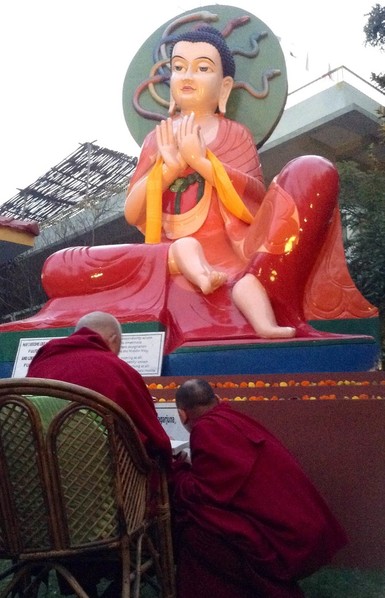 This month we are pleased to share with you The Precious Garland of Advice for a King, a text by the great Indian pandit Nagarjuna. This text is famous for its descriptions of the bodhisattva's path of compassion and for its clear, concise analysis of the Buddha's teachings on emptiness. The Precious Garland is freely available as a PDF, produced by Piero Sirianni, for viewing on your mobile device or computer.
This month we are pleased to share with you The Precious Garland of Advice for a King, a text by the great Indian pandit Nagarjuna. This text is famous for its descriptions of the bodhisattva's path of compassion and for its clear, concise analysis of the Buddha's teachings on emptiness. The Precious Garland is freely available as a PDF, produced by Piero Sirianni, for viewing on your mobile device or computer.- Why This Human Body is Most Precious: We have this human rebirth for a short time, and we must not waste this precious opportunity.
- The Need for Compassion in the World: Real happiness depends on the practice of compassion, the good heart.
- Refuge in Buddha, Dharma and Sangha: The Doctor, Medicine and Nurse: The Buddha, Dharma and Sangha are like the doctor, medicine and nurse guiding us on the path to enlightenment.
- Medicine Buddha is Important for Dharma Centers: How Medicine Buddha can bring peace and happiness, as well as both inner prosperity and external prosperity.
- Guru Devotion Is the Most Important Thing: A student wrote to Rinpoche about the practices they were doing in retreat. Rinpoche gave this advice.
- Severe Pain: Rinpoche gave this advice to an old student who had a debilitating illness and was in incredible pain.
- Purifying the Karma of Harming Mother: A student had become violent and harmed his mother physically. The student asked Rinpoche how he could purify the negative karma of his actions.
- Vajrayogini Visualization: Rinpoche sent this message to a student with a serious heart condition who was being taken to hospital.
You can always find a list of all the newly posted advices from Lama Zopa Rinpoche on our website.
New Books for Members
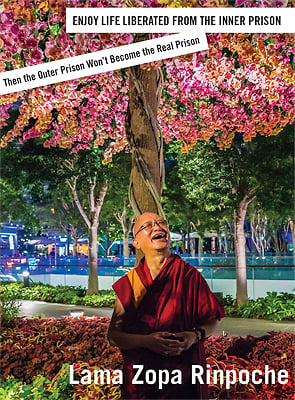 We are pleased to offer Members of Lama Yeshe Wisdom Archive two new books from Wisdom Publications and one forthcoming from Lama Yeshe Wisdom Archive:
We are pleased to offer Members of Lama Yeshe Wisdom Archive two new books from Wisdom Publications and one forthcoming from Lama Yeshe Wisdom Archive:
- Bodhichitta: Practice for a Meaningful Life by Lama Zopa Rinpoche is a clear and comprehensive explanation of bodhicitta, its benefits, and its importance to the path.
- How to Face Death Without Fear by Lama Zopa Rinpoche is a practical book on how to help loved ones have a beneficial death, compiled from years of Rinpoche's teachings and edited by Ven. Robina Courtin.
- Enjoy Life Liberated from the Inner Prison: Then the Outer Prison Won't Become the Real Prison is a compilation of advice from Lama Zopa Rinpoche, the spiritual director of Liberation Prison Project, in response to letters from many prisoners, mainly in the USA, edited into a coherent narrative by Ven. Robina Courtin.
LYWA members, if you are interested in receiving these books, and you have not already replied to an earlier email we sent out, please contact us with the following information:
- Would you like to receive a copy of Bodhichitta, How to Face Death Without Fear, Enjoy Life Liberated from the Inner Prison, or all of them?
- Would you prefer the ebook version or the print version?
- If you prefer the print version, please confirm your shipping address.
Please visit our website to learn more about the benefits of becoming a Member of LYWA. For a one-time donation of US$1,000, you can enjoy all the amazing benefits that membership brings, including 50 percent discount off Adele Hulse’s Big Love when purchased directly from LYWA.
OFFERING UP BIG LOVE
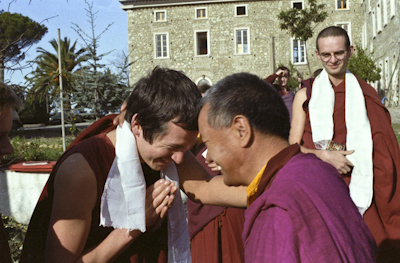 Previously we shared with you that we are offering free copies of Big Love: The Life and Teachings of Lama Yeshe with shipping included to International Mahayana Institute (IMI) Sangha members. Due to the kindness of several generous sponsors, 88 copies have been distributed to Sangha all over the world. If you would like to contribute to this fund, you can do so here. Please make a note in the note field that your donation is for Big Love copies for Sangha. Thanks again to all of you who stepped forward to make this happen!
Previously we shared with you that we are offering free copies of Big Love: The Life and Teachings of Lama Yeshe with shipping included to International Mahayana Institute (IMI) Sangha members. Due to the kindness of several generous sponsors, 88 copies have been distributed to Sangha all over the world. If you would like to contribute to this fund, you can do so here. Please make a note in the note field that your donation is for Big Love copies for Sangha. Thanks again to all of you who stepped forward to make this happen!
Big love,

Nick Ribush
Director
THIS MONTH'S TEACHING: Bodhicitta Is the Real Essential
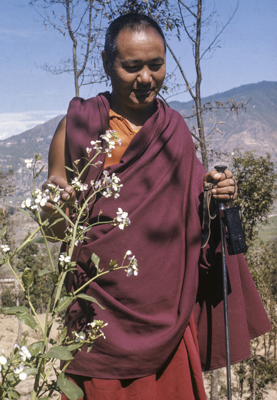 Bodhicitta itself makes us so completely peaceful, so happy. The self-cherishing thought is like putting a sword or knife into our heart; our heart is really hurt, relatively and absolutely! But bodhicitta is something which makes us completely relaxed. I think bodhicitta is unbelievable; it’s the most important thing we can practice in our entire life. It makes us really happy and there’s no room for others to disturb us. Otherwise, everybody is our enemy. The opposite of bodhicitta is feeling that everybody is an enemy.
Bodhicitta itself makes us so completely peaceful, so happy. The self-cherishing thought is like putting a sword or knife into our heart; our heart is really hurt, relatively and absolutely! But bodhicitta is something which makes us completely relaxed. I think bodhicitta is unbelievable; it’s the most important thing we can practice in our entire life. It makes us really happy and there’s no room for others to disturb us. Otherwise, everybody is our enemy. The opposite of bodhicitta is feeling that everybody is an enemy.
In the West, people sometimes think, “She is taking advantage; he is taking advantage; you are taking advantage.” People think that everybody takes advantage of them, but it’s not true. I know many people who think human beings take advantage of each other. Do you feel that way? I don’t know. It’s not true! Human beings have always been kind to each other, helping each other. Always. It’s our fundamental nature. So, bodhicitta helps us to relax even when we’re not meditating. Really, bodhicitta makes us content, satisfied. If somebody hits us, if somebody beats us, it’s still OK. If somebody’s criticizing us, it’s still OK. If somebody’s stealing our money, it’s still OK. If somebody does bad things to us, it’s still OK. The mind makes it OK; that’s all it is. And it’s the mind that makes it not OK, isn’t it?
So, I think bodhicitta is the best. In my opinion we all need bodhicitta, especially in Western society. If we have to integrate our practice into Western society’s working life, I think bodhicitta is the best way. Bodhicitta is definitely the best way to integrate our practice. In Western society people have very strong, concrete relationships with each other, for example, “I’m working for you,” or “You and me,” becomes so concrete. You say, “I want you to do this,” and I say, “Yes, I can do this much.” Do you know what I mean? In the beginning we have to talk to make such an incredible relationship, therefore bodhicitta is really, really important.
For me it seems like bodhicitta is the real essential. Western people can easily help others, but when we try to teach them indestructible samadhi meditation it is very difficult, because Western life is not made for that, unfortunately. Of course, we still have time. But we can practice bodhicitta so easily; we can see other people suffering, we can see our boss suffering, we can see the workers suffering, we can see so much suffering. Oh, my goodness, Western people have so much suffering, so much conflict. I really have compassion when I go to America. Californian people are sweet, they’re hardworking and physically they’re comfortable, but in their mind they’re going on an incredible trip. The more I stay, the more I have compassion for them. Really, they have so much suffering mentally. I don’t know, maybe it’s my projection, but I’m telling you my experience. I feel that those people have so much mental suffering.
So, in my opinion, bodhicitta is the best way. Bodhicitta makes our heart completely relaxed. In our life we have to deal with other peoples’ difficulties, so this helps. When people give us problems but at the same time we can be satisfied and can help them, this comes from bodhicitta. We should have bodhicitta; it is the best!
Even in a man-woman relationship, bodhicitta is very useful. A man can see the woman is suffering or the woman can see her partner is suffering—when you can see that, how can you add more suffering? Normally in relationships people hurt each other, don’t they? “I’m dissatisfied with him so I will hurt him.” Or he hurts her because he’s dissatisfied. Can you imagine? That’s the way it is. All these relationships are a disaster because they are not getting enough. You definitely decide, “I’m not getting enough from him (or her).” That is selfish—completely, purely selfish. I think that is clean clear. You hurt your partner because you are dissatisfied, because you are not getting pleasure. “I’m not getting pleasure, so I’m leaving!” That’s California style! It’s easy, isn’t it? It’s very easy. “I’m leaving. I’m dissatisfied, I’m not happy, therefore I’m leaving.” I think it’s completely selfish; it’s unbelievable! How can we always be happy with each other? We have so much garbage, so many trips inside.
How can I expect to always be happy with you? I cannot! I cannot guarantee that you people will be happy. It’s true! Therefore, you should accept it: “How can my selfish mind think it’s unfair this way? It’s not true. I should be reasonable. It’s natural that sometimes I get pleasure and sometimes I do not. I’m not happy but still I will try, and I will analyze what is wrong and why.”
This is excerpted from a question-and-answer session with Lama Yeshe during the Sixteenth Kopan Meditation Course held at Kopan Monastery, Nepal on December 8, 1983. Edited by Uldis Balodis. You can read the entire teaching here on our website and you can find it in the new Lama Yeshe ebook The Enlightened Experience: Collected Teachings, Volume 3.

























